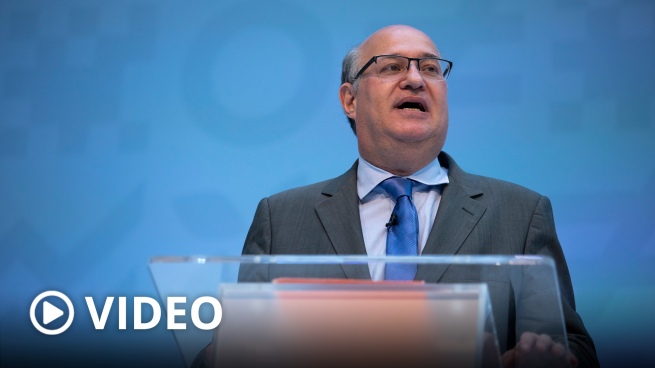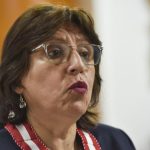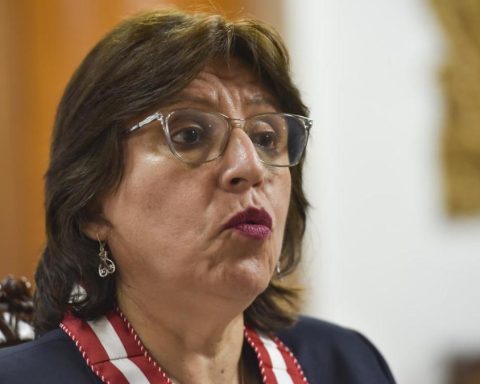The IMF affirmed that with the program underway and political support, Argentina will be able to lower inflation
WATCH VIDEO
The head of the International Monetary Fund (IMF), Kristalina Georgieva, highlighted on Thursday the commitment of the Argentine government to comply with the program agreed with the multilateral organization, noting that the Minister of Economy, Sergio Massa“the commitment to comply has been taken very seriously” with what was established in that understanding, and focused on the need to “control inflation”.
This was stated during the presentation conference of the Annual Assembly of the IMF and the World Bank that took place this morning in the city of Washington, in which he underlined the importance of the Government “taking very seriously the need to control the inflation”, something that, he considered, is “what the Argentine people expect”.
Later, in the afternoon, the director of the Western Department, Ilhan Goldfajn, who met with Massa on Tuesday in a bilateral meeting with the head of the mission for Argentina, Luis Cubeddú, maintained that “if Argentina continues to implement the agreed program with the IMF, with political support and in a sustained manner, will gradually lead the country to the correct path” to lower inflation.
“The main focus should be to follow the program”concluded Goldjfajn at a regional press conference, who met again on Thursday morning with Massa and his peers from the region, and who will attend the meeting of the Argentine Economy Minister with Gita Gopinath towards the end of the afternoon. .
The Fund is convinced that with the implementation of the current program, Argentina will be able to “gradually reduce inflation”while recognizing that the country does not have many other alternatives to redirect the economy, since “it cannot apply an exchange rate appreciation plan, because it needs to export and accumulate reserves,” summed up a source who is closely familiar with the IMF thinking about Argentina.
That is, the Fund bets that Argentina “comply with the program, and be able to rationalize the scarcity of resources, and that the country go in the direction of policies such as tariff segmentation, to better manage subsidies to those most in need”.
At the same time, the IMF considers that Argentina will reach a 1.9% fiscal deficit next year, and “an important expectation in this regard is deposited in the start-up of the Néstor Kirchner gas pipeline, which would be operational as of June , and that it will be able to moderate the deficit in the energy balance in July and August, and help reduce the fiscal deficit and the outflow of reserves,” the source summarized.
“It is what is called the supply policy, he continued, and meanwhile, in the face of scarcity, we must continue to make a demand policy with the improvement in the distribution of subsidies”limited the same spokesman, with the hope that over time energy subsidies will drop considerably.
While, Georgieva referred to the approval of the goals in the Board of Directors that Argentina achieved, which allowed triggering some US$3.8 billion in disbursements.
“We have been able to successfully complete the second review with close attention to the reaction of policy measures,” he said this morning, at a conference where the focus was on how to curb global inflation pressures.
“We cannot allow inflation to become a runaway train,” he warned.
Regarding Argentina, he added: “Our commitment is to the Argentine people and what they expect is that their government really takes very seriously the need to control inflation, reduce it and offer a platform for growth to accelerate, and that is what we support in our program.“.
In that sense, he deepened: “We are aware that, not only in Argentina, there are pressures from the public that go in the opposite direction to those who are most convenient, regarding the pressure to increase (public) expenses when this contributes to inflation.
At the same time, he was flexible in an eventual change of goals forward, but taking care of the popular well-being: “We do not think that a program has to be engraved in stone; if any part of the conditions changes, we will not be flexible against the interests of the people of Argentina“, held.
“When monetary policy hits the brakes,” he declared, “fiscal policy should not hit the accelerator,” he considered, by way of advice to countries suffering from inflation.

For his part, Goldfjan, asked if the program includes measures to counteract inflation, remarked that “the program has this in mind,” adding: “Clearly we have a directive for the program to help the vulnerable, with the most focused on social terms and subsidies”.
While Massa also participated in the G20 finance ministers summit, advanced in negotiations with the Paris Clubspoke with the Secretary of the Treasury of France and Secretary General of the organization, Emmanuel Moulin, and held bilateral talks with his Spanish peers (Nadia Calviño Santamaría, Vice President of the Government and Minister of Economic Affairs).
The Brazilian Minister of Economy, Paulo Guedes, on his Twitter account, highlighted that in his meeting with Massa they talked “on commercial and economic relations and opportunities for integration in productive infrastructure, the so-called transnational works that connect both countries”.
Lastly, Massa met with Pull Aside, with Pascal Saint-Amans, Chairman of the OECD Fiscal Affairs Committee, and with Paolo Gentiloni, EU Commissioner for the Economy, and lastly, he will conclude his official agenda today with the work of the World Bank Development Committee.


















